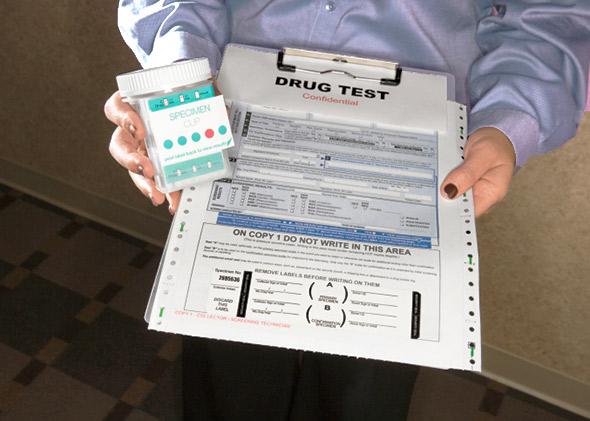Late last week Georgia lawmakers passed a measure to require drug tests for the state’s nearly 2 million food stamp recipients if case workers have “reasonable suspicion” a recipient was using illegal drugs. The bill’s sponsor, Rep. Greg Morris, calls this “common sense” legislation. “Hard working Georgians expect their tax dollars to be used responsibly and efficiently,” he said in a statement earlier this year. “Under no circumstance should the government fund someone’s drug habit.”
My guess is that most Georgians—and most Americans—would agree. But they’re wrong.
For the vast majority of people on public assistance, illicit drug use isn’t a problem. I’ve made this point before, but it’s worth restating the facts. Among women receiving Temporary Aid for Needy Families, the incidence rate for substance abuse is a scant 3.6 percent. Among food stamp recipients, it’s similarly low.
Operating under the widespread myth that drug use is tied to welfare dependence, states including Utah, Florida, and Missouri have instituted testing requirements for potential recipients. In each case, they’ve spent hundreds of thousands of dollars for little in the way of public gain. In Utah, only 12 people out of 466 showed evidence of drug use after a mandatory screening, at a cost of $25,000. From 2011 to 2012, more than 4,000 Floridians took drug tests for welfare benefits. Of them, 108 failed, at a total cost of $45,780.
Mandatory drug tests don’t solve a public policy problem as much as they perpetuate the false notion that drug use and substance abuse are concentrated among recipients of public aid. They aren’t.
But, for the sake of argument, let’s say that there were a drug problem among the pool of people who collect welfare, food stamps, and other forms of public assistance. And let’s say that some of those people used their benefits to purchase drugs, either directly or through bartering. Even in that case, it wouldn’t make sense to drug test for eligibility. Yes, you would save taxpayers some small amount of money, but every person removed from the system is someone deprived of resources—without the means to purchase food and other necessities—and abandoned to their addiction.
As a way to show public disapproval for drug use, this is great. As public policy, it’s terrible.
Among the purposes of the American social safety net is to prevent destitution and reduce the various harms associated with living in poverty. You don’t have to approve of their behavior to see that excluding drug users is counterproductive to that goal. If there’s a “right” approach, it isn’t to screen drug users out of the system; it’s to use drug tests to connect them with other services. In a sense, you want the government to fund someone’s drug habit, with strings attached.
For people with positive results, the “strings” could include mandatory drug counseling and treatment. You could also have an aggressive move to reduce the harms of substance abuse. For as much as we want to deter people from using drugs, there’s no reason not to work to reduce drug use while minimizing the risk of overdose and infectious disease.
In fact, deterrence plus harms reduction might be the best option since it could lower the overall cost of drug addiction to local communities. Needle exchanges, to use one example, are cheap and have been found to reduce the incidence of HIV among participants. That’s been the case in Washington, D.C., where, as Mike Riggs reports for the Atlantic, such a program has caused an 80 percent “decrease in the number of newly diagnosed HIV cases where the reported mode of transmission was injection drug use.” Other cities, such as Los Angeles, have found similar results and have saved large sums on treatment costs.
If, say, a state like Georgia wanted to be even more ambitious, it could take a page from Vancouver, British Columbia, which operates a medically supervised injection facility for intravenous drug users. Several multiyear studies of the facility have found good results.
Not only has it attracted the “right” kind of users—men and women at higher risk for HIV and other blood-borne diseases—but the surrounding community hasn’t seen an increase in intravenous drug use. In fact, one study found that the average Insite user had been injecting for 16 years and that only one person out of more than 1,000 reported doing their first injection at the facility, a strong suggestion that longtime addicts are coming to its doors, not new users. Insite has also connected users to needed health and social services, from HIV/AIDS treatment to detoxification programs.
It’s not hard to envision a system where, if you’re on public assistance or have applied, a positive drug test connects you to a use facility, where you can use drugs under medical supervision and enroll in treatment if you want to kick your addiction. We could also have the reverse, where we bring people into the public assistance program and then provide them drug treatment if they need it
No, voters and politicians won’t get the sweet satisfaction of condemning drug use and “government dependence,” but there are plenty of ways to register moral outrage that don’t require active harm against people who need help.
“But I don’t want my hard-earned tax dollars to go to lazy drug users!” says some commenter I just made up. That’s fair enough. I don’t want a quarter of my tax bill to go to the national security state. But what you or I want is less important than what we need. And in this case, just as we need a military and its associated bureaucracy, we need a more humane approach to public assistance and drug use. This is one way to do it, and a pretty good one.
